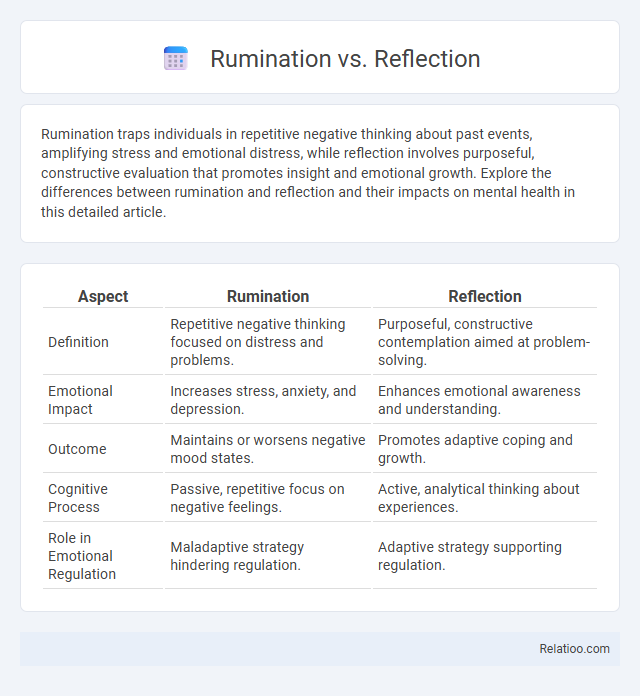Rumination traps individuals in repetitive negative thinking about past events, amplifying stress and emotional distress, while reflection involves purposeful, constructive evaluation that promotes insight and emotional growth. Explore the differences between rumination and reflection and their impacts on mental health in this detailed article.
Table of Comparison
| Aspect | Rumination | Reflection |
|---|---|---|
| Definition | Repetitive negative thinking focused on distress and problems. | Purposeful, constructive contemplation aimed at problem-solving. |
| Emotional Impact | Increases stress, anxiety, and depression. | Enhances emotional awareness and understanding. |
| Outcome | Maintains or worsens negative mood states. | Promotes adaptive coping and growth. |
| Cognitive Process | Passive, repetitive focus on negative feelings. | Active, analytical thinking about experiences. |
| Role in Emotional Regulation | Maladaptive strategy hindering regulation. | Adaptive strategy supporting regulation. |
Understanding Rumination and Reflection
Rumination involves repetitive, negative thinking that can intensify stress and hinder problem-solving, while reflection is a constructive process of thoughtful consideration aimed at gaining insight and emotional growth. Understanding the difference between rumination and reflection helps you identify when your thoughts become harmful coping mechanisms instead of tools for self-improvement. Cultivating reflection enables healthier mental habits, reducing the risk of emotional distress associated with rumination.
Key Differences Between Rumination and Reflection
Rumination involves repetitive, negative thinking about distressing situations that often leads to increased emotional distress and impairs problem-solving, while reflection is a purposeful, constructive process aimed at understanding experiences and fostering personal growth. Rumination traps Your mind in a loop of worry, intensifying anxiety and depression symptoms, whereas reflection promotes insight and adaptive coping strategies. Distinguishing these processes is crucial for mental health interventions, as reflection encourages solutions and emotional regulation, while rumination perpetuates harmful, passive coping patterns.
Psychological Impacts of Rumination
Rumination involves repetitive, negative thinking about distressing events, which can intensify feelings of anxiety and depression by reinforcing negative thought patterns. Reflection, in contrast, is a constructive process that allows You to analyze situations thoughtfully, promoting emotional insight and problem-solving skills. Harmful coping strategies like rumination prolong psychological distress and hinder recovery, while reflection supports mental resilience and healthier emotional regulation.
Benefits of Practicing Reflective Thinking
Reflective thinking enhances self-awareness by encouraging individuals to analyze experiences critically, leading to improved decision-making and emotional regulation. Unlike rumination, which often intensifies negative emotions, reflective thinking promotes constructive problem-solving and personal growth. Practicing reflection fosters resilience and mental clarity, making it an effective strategy for healthy coping and emotional well-being.
Common Triggers for Rumination
Common triggers for rumination include stress, unresolved conflicts, and negative feedback, which can cause repetitive and passive focus on distressing thoughts. Reflection, in contrast, involves purposeful and constructive evaluation of experiences to foster understanding and growth. Your ability to distinguish harmful coping through rumination from healthy reflection is crucial for mental well-being and emotional resilience.
How Reflection Enhances Emotional Intelligence
Reflection enhances emotional intelligence by fostering self-awareness and enabling individuals to critically examine their thoughts and emotions, leading to better emotional regulation. Unlike rumination, which involves repetitive and negative focus on distress, reflection promotes constructive insight and problem-solving. This mindful process supports adaptive coping strategies, reducing harmful coping behaviors and improving interpersonal relationships.
Identifying Rumination in Your Thought Patterns
Rumination is characterized by repetitive, passive focus on distressing thoughts, often leading to intensified anxiety and depression, unlike reflection, which involves active, solution-oriented thinking. Identifying rumination in your thought patterns includes noticing persistent negative loops without progress or insight, and recognizing when these thoughts are unproductive rather than problem-solving. Harmful coping techniques often overlap with rumination by reinforcing negative emotions instead of fostering resilience or emotional regulation.
Techniques to Shift from Rumination to Reflection
Shifting from rumination to reflection involves practices like mindfulness meditation and journaling to foster awareness and deliberate thought. Cognitive restructuring techniques help You challenge negative thought patterns, promoting constructive self-analysis rather than repetitive distress. Engaging in problem-solving exercises and setting specific time limits for reflection can reduce harmful coping mechanisms and support mental clarity.
The Role of Mindfulness in Reducing Rumination
Mindfulness plays a crucial role in reducing rumination, a repetitive and negative thought pattern linked to anxiety and depression. By fostering present-moment awareness, mindfulness helps individuals break free from unproductive cycles of rumination, promoting healthier reflection that supports emotional regulation and problem-solving. Studies show that mindfulness-based interventions significantly lower rumination levels while enhancing cognitive flexibility and psychological resilience.
Cultivating Healthy Self-Reflection for Personal Growth
Rumination involves repetitive, negative thinking that traps Your mind in past mistakes, while reflection encourages a balanced analysis of experiences to foster learning and growth. Harmful coping methods, such as avoidance or denial, hinder emotional processing and stall personal development. Cultivating healthy self-reflection enhances emotional intelligence, promotes resilience, and supports meaningful personal growth by transforming challenges into opportunities for insight.

Infographic: Rumination vs Reflection
 relatioo.com
relatioo.com